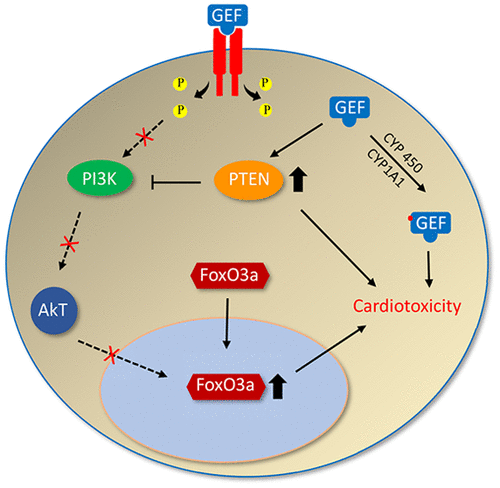当前位置:
X-MOL 学术
›
Chem. Res. Toxicol.
›
论文详情
Our official English website, www.x-mol.net, welcomes your feedback! (Note: you will need to create a separate account there.)
EGFR Inhibitor Gefitinib Induces Cardiotoxicity through the Modulation of Cardiac PTEN/Akt/FoxO3a Pathway and Reactive Metabolites Formation: In Vivo and in Vitro Rat Studies.
Chemical Research in Toxicology ( IF 4.1 ) Pub Date : 2020-05-06 , DOI: 10.1021/acs.chemrestox.0c00005 Ali Alhoshani 1 , Fawaz E Alanazi 1, 2 , Moureq R Alotaibi 1 , Mohamed W Attwa 3, 4 , Adnan A Kadi 3 , Abdullah Aldhfyan 5 , Sabah Akhtar 6 , Shireen Hourani 6 , Abdelali Agouni 6 , Asad Zeidan 7 , Hesham M Korashy 6
Chemical Research in Toxicology ( IF 4.1 ) Pub Date : 2020-05-06 , DOI: 10.1021/acs.chemrestox.0c00005 Ali Alhoshani 1 , Fawaz E Alanazi 1, 2 , Moureq R Alotaibi 1 , Mohamed W Attwa 3, 4 , Adnan A Kadi 3 , Abdullah Aldhfyan 5 , Sabah Akhtar 6 , Shireen Hourani 6 , Abdelali Agouni 6 , Asad Zeidan 7 , Hesham M Korashy 6
Affiliation

|
Gefitinib (GEF) is a selective inhibitor of the epidermal growth factor receptor (EGFR) used to treat non-small cell lung cancer. Yet, few cases of cardiotoxicity have been reported. However, the role of the PTEN/Akt/FoxO3a pathway, which mediates GEF anticancer activity, in GEF cardiotoxicity remains unclear. For this purpose, in vitro H9c2 cells and in vivo rat cardiomyocytes were utilized as study models. Treatment of H9c2 cells and Sprague–Dawley rats with GEF significantly induced the expression of hypertrophic and apoptotic markers at mRNA and protein levels with an increased plasma level of troponin. This was accompanied by induction of autophagy and mitochondrial dysfunction in H9c2 cells. Inhibition of cardiac EGFR activity and Akt cellular content of in vitro and in vivo rat cardiomyocytes by GEF increased PTEN and FoxO3a gene expression and cellular content. Importantly, treatment of H9c2 cells with PI3K/Akt inhibitor increased PTEN and FoxO3a mRNA expression associated with potentiation of GEF cardiotoxicity. In addition, by using LC-MS/MS, we showed that GEF is metabolized in the rat heart microsomes into one cyanide- and two methoxylamine-adduct reactive metabolites, where their formation was entirely blocked by CYP1A1 inhibitor, α-naphthoflavone. The current study concludes that GEF induces cardiotoxicity through modulating the expression and function of the cardiac PTEN/AKT/FoxO3a pathway and the formation of CYP1A1-mediated reactive metabolites.
中文翻译:

EGFR抑制剂吉非替尼通过调节心脏PTEN / Akt / FoxO3a途径和反应性代谢产物的形成诱导心脏毒性:体内和体外大鼠研究。
吉非替尼(GEF)是用于治疗非小细胞肺癌的表皮生长因子受体(EGFR)的选择性抑制剂。然而,很少有心脏毒性病例的报道。然而,尚不清楚PTEN / Akt / FoxO3a途径介导GEF抗癌活性在GEF心脏毒性中的作用。为此,将体外H9c2细胞和体内大鼠心肌细胞用作研究模型。用GEF处理H9c2细胞和Sprague-Dawley大鼠时,随着肌钙蛋白血浆水平的升高,可显着诱导mRNA和蛋白水平的肥大和凋亡标记物的表达。这伴随着H9c2细胞中自噬和线粒体功能障碍的诱导。体外抑制心脏EGFR活性和Akt细胞含量而体内大鼠心肌细胞则通过GEF增加PTEN和FoxO3a基因的表达和细胞含量。重要的是,用PI3K / Akt抑制剂处理H9c2细胞会增加与GEF心脏毒性增强相关的PTEN和FoxO3a mRNA表达。此外,通过使用LC-MS / MS,我们显示GEF在大鼠心脏微粒体内代谢为一种氰化物和两种甲氧基胺加合物的反应性代谢物,其中它们的形成被CYP1A1抑制剂α-萘黄酮完全阻断。当前的研究得出结论,GEF通过调节心脏PTEN / AKT / FoxO3a途径的表达和功能以及CYP1A1介导的反应性代谢物的形成来诱导心脏毒性。
更新日期:2020-05-06
中文翻译:

EGFR抑制剂吉非替尼通过调节心脏PTEN / Akt / FoxO3a途径和反应性代谢产物的形成诱导心脏毒性:体内和体外大鼠研究。
吉非替尼(GEF)是用于治疗非小细胞肺癌的表皮生长因子受体(EGFR)的选择性抑制剂。然而,很少有心脏毒性病例的报道。然而,尚不清楚PTEN / Akt / FoxO3a途径介导GEF抗癌活性在GEF心脏毒性中的作用。为此,将体外H9c2细胞和体内大鼠心肌细胞用作研究模型。用GEF处理H9c2细胞和Sprague-Dawley大鼠时,随着肌钙蛋白血浆水平的升高,可显着诱导mRNA和蛋白水平的肥大和凋亡标记物的表达。这伴随着H9c2细胞中自噬和线粒体功能障碍的诱导。体外抑制心脏EGFR活性和Akt细胞含量而体内大鼠心肌细胞则通过GEF增加PTEN和FoxO3a基因的表达和细胞含量。重要的是,用PI3K / Akt抑制剂处理H9c2细胞会增加与GEF心脏毒性增强相关的PTEN和FoxO3a mRNA表达。此外,通过使用LC-MS / MS,我们显示GEF在大鼠心脏微粒体内代谢为一种氰化物和两种甲氧基胺加合物的反应性代谢物,其中它们的形成被CYP1A1抑制剂α-萘黄酮完全阻断。当前的研究得出结论,GEF通过调节心脏PTEN / AKT / FoxO3a途径的表达和功能以及CYP1A1介导的反应性代谢物的形成来诱导心脏毒性。


























 京公网安备 11010802027423号
京公网安备 11010802027423号